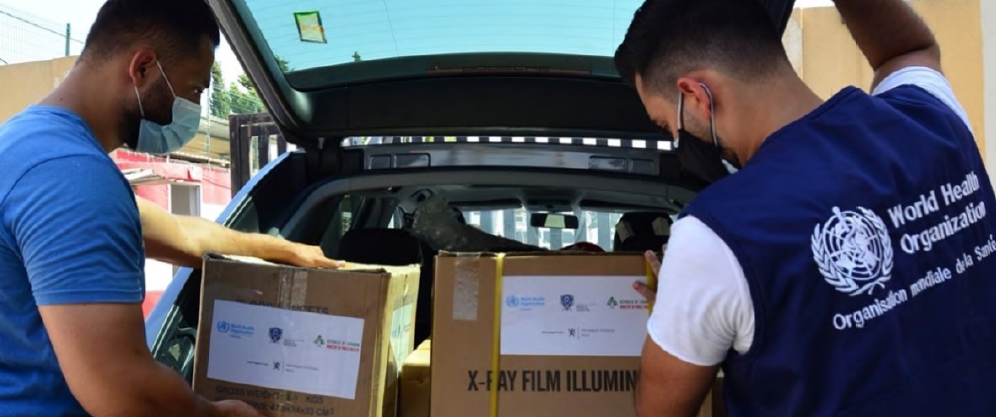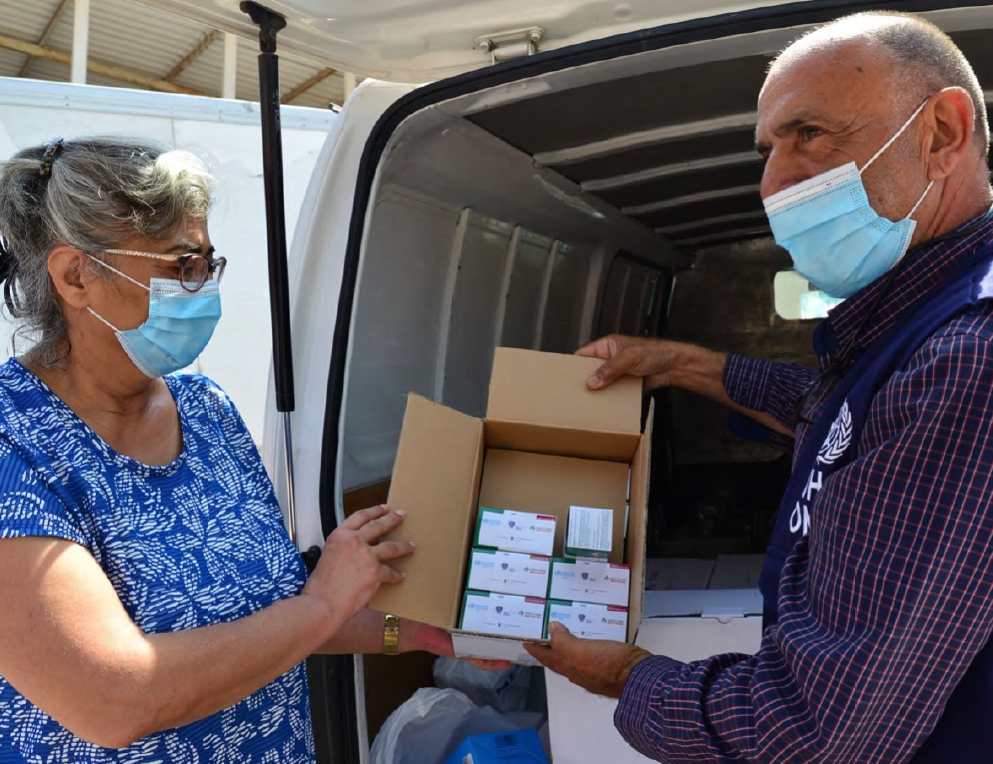.tmb-768v.png?Culture=en&sfvrsn=54737d84_1)
Providing essential noncommunicable disease and mental health services: the case of Roumieh Central Prison, Lebanon
Key learning points
The COVID-19 pandemic opened windows of opportunity to improve the prison health system and bring partners together in synergy. WHO is continuing its support in order to complete the comprehensive health assessment and move towards electronic health records, support the integration of Roumieh Medical Centre in the MoPH PHC network and to address other public health issues, such as environmental health concerns and nutrition.
Background
Roumieh Central Prison is the largest prison in Lebanon and houses about 3500 inmates, representing 60% of Lebanon’s incarcerated population. A medical centre has been established in Roumieh, with nurses and general physicians available 24/7. Prisons, particularly Roumieh, suffer shortages of medical staff, especially nurses, which hinders timely access to health care for inmates, including mental health care.
The first confirmed case of COVID-19 in Lebanon was reported on 21 February 2020. The pandemic struck during a challenging political and economic situation in Lebanon, which was further worsened by the Beirut port explosions, which took place on 4 August 2020.
The first COVID-19 positive cases among inmates in Roumieh prison were reported on 11 September 2020. A COVID-19 preparedness and response plan was developed for Roumieh prison following coordination with key stakeholders intervening in the context of COVID-19.
Impact of COVID-19 on essential health services
Uncontrolled noncommunicable diseases (NCDs), along with crowded living conditions put inmates at high risk of contracting COVID-19 and suffer severe symptoms and complications.
WHO, the Ministry of Public Health (MoPH), Ministry of the Interior and Municipalities, the International Committee of the Red Cross (ICRC) and the United Nations Office for Drugs and Crime (UNODC) collaborated to draw up an action plan to support the COVID-19 response in prisons worldwide. The aim was to prevent the spread of the virus among inmates, internal security forces, other staff, and visitors; to enable the resumption of admissions and to protect inmates from severe COVID-19 and its complications in case of an outbreak. Additional funding to support the prison COVID-19 response was received from the Norwegian Embassy in Lebanon, the European Union and the German KfW (Germany’s state-owned development bank). WHO convened an infectious disease team to conduct joint field visits in order to identify entry points for COVID-19. With the support of ICRC, a building in the prison was repurposed to be an isolation and quarantine centre for new inmates before admission into prison. A protocol for admissions, testing and quarantine was established. A team of nurses was made available 24/7 by WHO in the isolation building to manage the COVID-19 response, including education and screening those who fit suspected case definitions and monitoring. Transport protocols were established for medical conditions that could not be treated in the prison clinic, and there were a number of lifesaving referrals to hospital. The prison ward in the nearby hospital that admits inmates (Dahr El Bachek hospital) was rehabilitated and equipped by WHO and ICRC.
What was the intervention or activity?
In September 2019, before the advent of the COVID-19 pandemic, a project on improving physical and mental health services was initiated after a funding opportunity was secured from the Norwegian Ministry of Foreign Affairs. Its aim was to increase access to health and mental health services and support health promotion and prevention in prisons. Due to a shortage of data on prison populations, an initial objective was to undertake a comprehensive health assessment on inmates, to collect data on their health status in preparation for developing electronic health records.
A team of nurses and social workers was recruited in September 2020 to work across the five buildings in Roumieh Central Prison not being used for isolation. They focused on NCD care, including identifying those with previously diagnosed chronic conditions (through pharmacy records, prison records and self-reporting), screening for common diseases, monitoring and stabilization of inmates with uncontrolled conditions. They prioritized individuals older than 55 and those with known chronic conditions putting them at increased risk of developing COVID-19 complications. It was found that 16% of inmates had cardiac diseases and another 10% had both diabetes and hypertension. WHO also rehabilitated the prison clinics and equipped them with medical equipment including blood pressure machines, glucometers, nebulizer masks, and height and weight scales, among other supplies.

Delivery of medical equipment to Roumieh Central Prison, Lebanon (photo credit: WHO Lebanon / H. Nassif)
How did this intervention/activity contribute to the maintenance of EHS?
As COVID-19 cases decreased in Lebanon and inmates started to receivevaccines, focus returned to the comprehensive health assessment and preparing electronic health records and the Health Information System. In February 2021, three additional nurses were recruited to accelerate the comprehensive health assessment. In May 2021, three family physicians were recruited to conduct the comprehensive health assessment. Based on national protocols of care that were adapted to the prison context, over 1500 inmates received a comprehensive health assessment. Following this, more than 500 inmates received mental health consultations, and 150 ophthalmology consultations. Inmates found to have NCDs were counselled about managing their disease, including nutrition, while group awareness sessions focusing on COVID-19 and chronic conditions, including vaccination against COVID-19, were also conducted. Following an assessment of the prison medical centre, additional equipment was procured (such as an electrocardiogram, ophthalmoscopes, examination tables, spirometers, etc.) in order to bring the centre up to the standard of the MoPH primary health clinics, in preparation for integrating it into the MoPH Primary Health Care network.

Examination room in Roumieh Central Prison, Lebanon (photo credit: WHO Lebanon / H. Nassif)
What were the key challenges involved? How were these challenges overcome?
Despite the initial disruption and fear caused by the COVID-19 pandemic, the coordinated response to control the infection in prison provided an opportunity to gain the trust of inmates and personnel, build health care capacity in the prison, and eventually carry out the originally planned health assessment, facilitating the integration of Roumieh health clinic into the PHC network. The prison would benefit from essential medications, including NCDs and mental health medications, which are distributed to this network, ultimately providing inmates with the same level of care as they would receive in the community. This would also allow inmates to gain continued access to NCD services in primary care after being discharged from prison, helping them reintegrate into society.
Nevertheless, the current economic crisis in Lebanon is affecting everyone on several levels. Many health care professionals, including some involved in the project described above, have left the country. Fuel shortages have made it difficult for others to reach the prison. Shortages in medication, medical supplies and laboratory services have limited hospital admissions to urgent and critical cases only.



